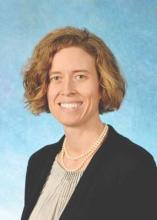The role that health care providers can and should play in promoting breastfeeding has come under scrutiny in recent years, often leaving doctors uncertain about how to discuss infant-feeding intentions with patients.
There’s been a backlash against the public health promotion of breastfeeding and “lactivism,” with critics saying that the efforts lead to shame or guilt in women who do not breastfeed. And often mothers, and their physicians, have been caught in the crossfire.
The American College of Obstetricians and Gynecologists attempted to build a bridge across this divide in their updated Committee Opinion on breastfeeding in February.
In a departure from the language typically included in policy statements or clinical guidelines from other medical organizations, the new ACOG guidelines urged ob.gyns. and other obstetric care providers to “support each woman’s informed decision about whether to initiate or continue breastfeeding, recognizing that she is uniquely qualified to decide whether exclusive breastfeeding, mixed feeding, or formula feeding is optimal for her and her infant.”
At the same time, however, the organization also “recommends exclusive breastfeeding for the first 6 months of life, with continued breastfeeding as complementary foods are introduced through the infant’s first year of life, or longer as mutually desired by the woman and her infant.”
Striking the right balance in providing women with adequate information to make informed choices without inadvertently causing a woman discomfort requires clinicians to start by finding out what their patients already know, according to Dr. Alison Stuebe, lead author of the ACOG opinion and an assistant professor of maternal-fetal medicine at the University of North Carolina at Chapel Hill.
“The clinician’s role is to help that mom make an informed decision, and it’s hard to help her do that if you don’t know where she’s coming from,” Dr. Stuebe said. “It’s important not to assume that a woman knows everything or knows nothing.”
How to start the conversation
Dr. Stuebe, who is also a distinguished scholar of infant and young child feeding in the Gillings School of Global Public Health at UNC, recommended bringing up the subject of breastfeeding early in a woman’s prenatal care with a simple open-ended question: “What have you heard about breastfeeding?” The answer helps tailor the counseling to the mother’s knowledge, feelings, and attitudes.
“We have some moms who have read 47 books on breastfeeding, and then there are women who live in a family where they’ve only seen bottle feeding,” Dr. Stuebe said.
Next, validate what the mother says, and ask for more information from the mom. When the conversation begins early in the physician-patient relationship, there is time to have the conversation over several visits, Dr. Stuebe said.
“I think asking the question in a nonjudgmental, truly open-ended way and listening to what mom says and paraphrasing it back to her hopefully helps her feel comfortable enough to go into a bit more detail,” she said. “I don’t ask people to commit. I take notes and we talk about it at another visit.”
Dr. Stuebe also suggested making sure mothers are aware of the benefits of breastfeeding for their own health – such as a reduced risk of type 2 diabetes and breast cancer – so that the conversation is not framed entirely in terms of benefits for their child.
Fear of upsetting a patient, however, should not dissuade physicians from broaching the subject, she added. “In the fear of making moms feel bad, we sometimes tiptoe and miss an opportunity to provide moms with an opportunity to make an informed choice.”
That would be especially unfortunate given the respect individuals continue to have for advice from their physicians, said Lora Ebert Wallace, Ph.D., professor of sociology at Western Illinois University in Macomb, who has studied the impact of language used in breastfeeding discourse.
“Medical authority is a real thing,” Dr. Wallace said. “People listen to their doctors and respect them, and doctors want to be really thoughtful about how to communicate, starting with questions instead of prescriptions.”
Avoiding ‘risk’ language
In reality, much of the backlash against breastfeeding prescriptivism has not involved the ob.gyn. community, Dr. Wallace noted.
“I think generally ob.gyns. have not been on the forefront of the type of advocacy that people have objected to,” she said. “I think that’s come from other areas of medicine.”
Some of that advocacy has employed “risk language,” in which breastfeeding is presented as the only appropriate choice and the conversation centers around the “risk” of formula feeding instead of the “benefits” of breastfeeding.



